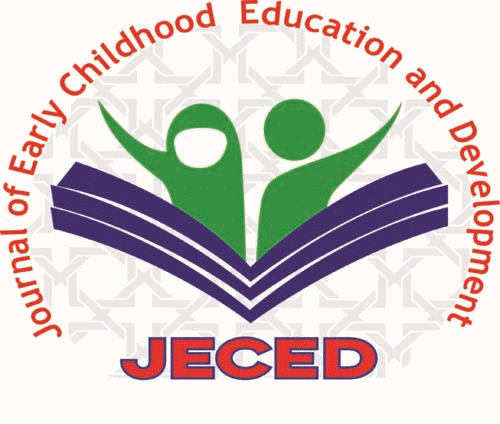Kompleksitas Penyelenggaraan Akreditasi Berbasis Online pada Lembaga PAUD
DOI:
https://doi.org/10.15642/jeced.v4i2.1971Keywords:
accreditation, PAUD institution, problems onlineAbstract
Online-based PAUD accreditation is not without problems. There are various problems that show the complexity of the implementation of online-based PAUD accreditation at PAUD institutions in Banyumas district. This study aims to describe and analyze the complexity that occurs in the implementation of online-based accreditation at PAUD institutions in Banyumas district. This study uses a quantitative method that is descriptive in nature where the researcher can describe the results of the research that has been carried out by describing the object of research at the current state based on the actual facts then analyzed and interpreted. Based on the results of the research, the findings were in the form of obstacles or problems faced in implementing online PAUD accreditation including: (1) lack of guidance related to the eight National PAUD Education Standards; (2) lack of assistance in filling in the EDS-PA on the Sispena application; (3) teachers' limited ICT skills; and (4) limited internet network in PAUD institutions.
Downloads
References
Alwi, H., et. al. (2002). Kamus Besar Bahasa Indonesia. Balai Pustaka.
Asiah, S. N. (2018). Analisis Manajemen PAUD Berbasis Standar Akreditasi PAUD dan PNF di Kutai Kartanegara. SYAMIL: Jurnal Pendidikan Agama Islam (Journal of Islamic Education), 6(1). https://doi.org/10.21093/sy.v6i1.1325
Bender, D. (2021). Internship assessment in professional program accreditation: A 10-year study. Education + Training, 63(2), 256–270. https://doi.org/10.1108/ET-11-2019-0251
Bendixen, C., & Jacobsen, J. C. (2020). Accreditation of higher education in Denmark and European Union: From system to substance? Quality in Higher Education, 26(1), 66–79. https://doi.org/10.1080/13538322.2020.1729310
Busron, B., & Rachmi, T. (2020). Analisis Capaian Standar dan Pemanfaatan Hasil Akreditasi PAUD Provinsi Banten. Ceria: Jurnal Program Studi Pendidikan Anak Usia Dini, 8(2), 1. https://doi.org/10.31000/ceria.v11i2.2335
Daryati, M. E., & Supratman, J. W. (2021). BIMBINGAN TEKNOLOGI INSTRUMEN PENILAIAN PRASYARAT AKREDITASI PENDIDIKAN ANAK USIA DINI. 2, 12.
Ernawati, I. (2017). UJI KELAYAKAN MEDIA PEMBELAJARAN INTERAKTIF PADA MATA PELAJARAN ADMINISTRASI SERVER. Elinvo (Electronics, Informatics, and Vocational Education), 2(2), 204–210. https://doi.org/10.21831/elinvo.v2i2.17315
Febriani, E., & Warmansyah, J. (2021). Akreditasi Satuan PAUD Berbasis Sistem Penilaian Akreditasi (SISPENA). JOSTECH: Journal of Science and Technology, 1(2), 124–135. https://doi.org/10.15548/jostech.v1i2.3053
Fedyk, W., Sołtysik, M., Oleśniewicz, P., Borzyszkowski, J., & Weinland, J. (2021). Human resources management as a factor determining the organizational effectiveness of DMOs: A case study of RTOs in Poland. International Journal of Contemporary Hospitality Management, 33(3), 828–850. https://doi.org/10.1108/IJCHM-07-2020-0702
Galunic, D. C., & Weeks, J. R. (2017). Intraorganizational Ecology. In J. A. C. Baum (Ed.), The Blackwell Companion to Organizations (pp. 75–97). Blackwell Publishing Ltd. https://doi.org/10.1002/9781405164061.ch3
Handayani, M. (2016). PENCAPAIAN STANDAR NASIONAL PENDIDIKAN BERDASARKAN HASIL AKREDITASI SMA DI PROVINSI DKI JAKARTA. Jurnal Pendidikan Dan Kebudayaan, 1(2), 179–201. https://doi.org/10.24832/jpnk.v1i2.766
Lindriany, J., Hidayati, D., & Muhammad Nasaruddin, D. (2022). Urgensi Literasi Digital Bagi Anak Usia Dini Dan Orang Tua. Journal of Education and Teaching (JET), 4(1), 35–49. https://doi.org/10.51454/jet.v4i1.201
Love, H. R., & Horn, E. (2021). Definition, Context, Quality: Current Issues in Research Examining High-Quality Inclusive Education. Topics in Early Childhood Special Education, 40(4), 204–216. https://doi.org/10.1177/0271121419846342
Medaille, A., Goldrup, S., & Abernathy, T. (2019). Assessing Rigor in Teacher Education: Do NCTQ’s Guidelines Measure Up? The Teacher Educator, 54(1), 72–89. https://doi.org/10.1080/08878730.2018.1516260
Nuhayati, H., Rusdiyani, I., & Fadlullah. (2022). Implementasi Akreditasi Online Lembaga PAUD dalam Penjaminan Mutu Lembaga PAUD di Kabupaten Serang. JTPPm (Jurnal Teknologi Pendidikan Dan Pembelajaran) : Edutech and Intructional Research, 9(2), 1–13.
Otterborn, A., Schönborn, K., & Hultén, M. (2019). Surveying preschool teachers’ use of digital tablets: General and technology education related findings. International Journal of Technology and Design Education, 29(4), 717–737. https://doi.org/10.1007/s10798-018-9469-9
Sugiyono, S. (2010). Metode Penelitian Kuantitaif, Kualitatif dan R & D. Alfabeta.
van der Spoel, I., Noroozi, O., Schuurink, E., & van Ginkel, S. (2020). Teachers’ online teaching expectations and experiences during the Covid19-pandemic in the Netherlands. European Journal of Teacher Education, 43(4), 623–638. https://doi.org/10.1080/02619768.2020.1821185
Yuliana, L., & Raharjo, S. B. (2019). KETERCAPAIAN STANDAR NASIONAL PENDIDIKAN DI SEKOLAH MENENGAH ATAS. Jurnal Pendidikan Dan Kebudayaan, 4(2), 197–212. https://doi.org/10.24832/jpnk.v4i2.1457
Zahay, D., Altounian, D., Pollitte, W., & James, J. (2019). EFFECTIVE RESOURCE DEPLOYMENT IN DIGITAL MARKETING EDUCATION. Marketing Education Review, 29(3), 182–192. https://doi.org/10.1080/10528008.2018.1555000
Downloads
Published
How to Cite
Issue
Section
License
Copyright (c) 2022 JECED : Journal of Early Childhood Education and Development

This work is licensed under a Creative Commons Attribution-ShareAlike 4.0 International License.
Copyright Notice
The copyright of the received article once accepted for publication shall be assigned to the journal as the publisher of the journal. The intended copyright includes the right to publish the article in various forms (including reprints). The journal maintains the publishing rights to the published articles.








































